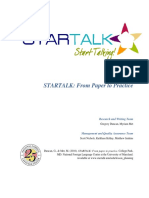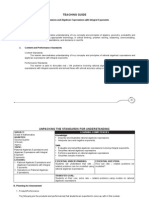Bloom's Taxonomy in Mathematics
Bloom's Taxonomy in Mathematics
Uploaded by
Marc FarmerCopyright:
Available Formats
Bloom's Taxonomy in Mathematics
Bloom's Taxonomy in Mathematics
Uploaded by
Marc FarmerCopyright
Available Formats
Share this document
Did you find this document useful?
Is this content inappropriate?
Copyright:
Available Formats
Bloom's Taxonomy in Mathematics
Bloom's Taxonomy in Mathematics
Uploaded by
Marc FarmerCopyright:
Available Formats
491
Blooms Taxonomy and knowledge taxonomy verbs
Although Benjamin Bloom developed his classification of levels of intellectual behavior important in learning, (the now classic Taxonomy of Instructional Objectives) in 1956, research continues to support the value of objectives that involve the understanding and use of knowledge, those that are usually considered the most important goals of education. In his Taxonomy, Bloom identified three areas in which learning takes place the cognitive, affective, and psychomotor domains. In the cognitive domain, which deals with the recall or recognition of knowledge and the development of intellectual ability, six major levels are usually identified. These levels are knowledge, comprehension, application, analysis, synthesis, and evaluation. Each level becomes progressively more complex and builds upon the previous level. So, not only is synthesis a more complex operation than knowledge, but the ability to synthesize depends upon the foundation of knowledge possessed by the learner. By using questions requiring higher-order thinking, teacher questioning moves beyond an assessment tool and becomes a valuable instructional tool as well. Level Knowledge Definition Remember previously learned information, recognize and recall facts and specifics Comprehension Understand the meaning of information, summarize or paraphrase given information Application Utilize knowledge in actual situations, use information in a situation different from the original learning context Analysis Break down objects or ideas into simpler parts, see how the parts relate and are organized, better understand the organization of the whole and the relationships between the parts Synthesis Rearrange component ideas into a new whole, combine elements learned into a new entity Evaluation Make judgments based on internal evidence or external criteria, make decisions, judge, or select based on criteria and rationale Verb List Knowledge arrange, define, match, check, order, choose, find, recall, group, identify, label, list, select, locate, name, recognize, count, draw, find
Comprehension calculate, discuss, select, convert, restate, solve, classify, give examples, predict, review, describe, explain, identify, generalize
Application relate, apply, change, choose, compute, demonstrate, discover, illustrate, predict, relate, show, sketch, solve
Analysis analyze, calculate, categorize, compare, contrast, differentiate, discriminate, distinguish, examine, experiment, question, test
Synthesis arrange, collect, compose, construct, create, design, develop, formulate, organize, plan, prepare, propose, set up
Evaluation appraise, argue, assess, attach, choose compare, defend estimate, judge, predict, rate, select, support, evaluate
492
Developing Mathematical Thinking with Effective Questions
To help students build confidence and rely on their own understanding, ask Why is that true? How did you reach that conclusion? Does that make sense? Can you make a model to show that? To help students learn to reason mathematically, ask Is that true for all cases? Explain. Can you think of a counterexample? How would you prove that? What assumptions are you making? To check student progress, ask Can you explain what you have done so far? What else is there to do? Why did you decide to use this method? Can you think of another method that might have worked? Is there a more efficient strategy? What do you notice when? Why did you decide to organize your results like that? Do you think this would work with other numbers? Have you thought of all the possibilities? How can you be sure? To help students collectively make sense of mathematics, ask What do you think about what _____ said? Do you agree? Why or why not? Does anyone have the same answer but a different way to explain it? Do you understand what _____ is saying? Can you convince the rest of us that your answer makes sense? To encourage conjecturing, ask What would happen if? What if not? Do you see a pattern? Can you explain the pattern? What are some possibilities here? Can you predict the next one? What about the last one? What decision do you think he/she should make? To promote problem solving, ask What do you need to find out? What information do you have? What strategies are you going to use? Will you do it mentally? With pencil and paper? Using a number line? Will a calculator help? What tools will you need? What do you think the answer or result will be?
493
To help when students get stuck, ask How would you describe the problem in your own words? What do you know that is not stated in the problem? What facts do you have? How did you tackle similar problems? Could you try it with simpler numbers? Fewer numbers? Using a number line? What about putting things in order? Would it help to create a diagram? Make a table? Draw a picture? Can you guess and check? Have you compared your work with anyone else? What did other members of your group try? To make connections among ideas and applications, ask How does this relate to? What ideas that we have learned before were useful in solving this problem? What uses of mathematics did you find in the newspaper last night? Can you give me an example of? To encourage reflection, ask How did you get your answer? Does your answer seem reasonable? Why or why not? Can you describe your method to us all? Can you explain why it works? What if you had started with rather than? What if you could only use? What have you learned or found out today? Did you use or learn any new words today? What do they mean? How do you spell them? What are the key points or big ideas in this lesson?
www.pbs.org/teacherline
You might also like
- Geometry SyllabusDocument7 pagesGeometry Syllabusapi-237846437No ratings yet
- Differentiated Instruction LessonDocument8 pagesDifferentiated Instruction Lessonapi-281761290No ratings yet
- Lesson Plan Quadratic FormulaDocument4 pagesLesson Plan Quadratic Formulaapi-309707623100% (1)
- Calculus 3208 Curriculum Guide PDFDocument258 pagesCalculus 3208 Curriculum Guide PDFLuckyNo ratings yet
- Reflective Lesson Plan 6 Distance FormulaDocument7 pagesReflective Lesson Plan 6 Distance Formulaapi-339897912100% (1)
- 7 - Slope-Intercept Formal Lesson PlanDocument2 pages7 - Slope-Intercept Formal Lesson Planapi-304704633No ratings yet
- Geometry Performance TaskDocument29 pagesGeometry Performance TaskAshley RoundsNo ratings yet
- Marzano Focused Model: Lesson PlanDocument5 pagesMarzano Focused Model: Lesson Planapi-325030256No ratings yet
- CC Math 8 Curriculum Map - 3 - 17 - 15Document29 pagesCC Math 8 Curriculum Map - 3 - 17 - 15Junalyn MugotNo ratings yet
- Prof Ed 4 Gagne TheoryDocument2 pagesProf Ed 4 Gagne TheoryChristine Joy Zonio100% (1)
- 1st Observation (Lesson Plan)Document4 pages1st Observation (Lesson Plan)Madelyn Undap100% (1)
- Problems and Issues in Curriculum DevelopmentDocument3 pagesProblems and Issues in Curriculum DevelopmentMuhammad Asif100% (1)
- Sets An IntroductionDocument2 pagesSets An IntroductionJean Marie Ga LacsonNo ratings yet
- Quadratic Functions UbDDocument6 pagesQuadratic Functions UbDVia Terrado CañedaNo ratings yet
- Unit 1 Grasps Task - Task SheetDocument8 pagesUnit 1 Grasps Task - Task SheetGhala AlHarmoodiNo ratings yet
- Blooms Taxonomy For MathDocument1 pageBlooms Taxonomy For MathAgui S. T. PadNo ratings yet
- Components of Curriculum Design Semi-Detailed Lesson PlanDocument3 pagesComponents of Curriculum Design Semi-Detailed Lesson PlanJama Jude FebriaNo ratings yet
- LessonPlanningGuide PDFDocument19 pagesLessonPlanningGuide PDFKaren PerezNo ratings yet
- Professional Development Lesson PlanDocument3 pagesProfessional Development Lesson PlanlsbrooksNo ratings yet
- Research-Based Teaching and Learning in The 21st CenturyDocument70 pagesResearch-Based Teaching and Learning in The 21st CenturyAnonymous E8yT3R4iNo ratings yet
- Lesson Plan FormDocument6 pagesLesson Plan Formapi-489855639No ratings yet
- LUSD Whole Group Lesson Design TemplateDocument2 pagesLUSD Whole Group Lesson Design TemplateJuanNo ratings yet
- Decilesfor Grouped DataDocument9 pagesDecilesfor Grouped DataJinky TabigneNo ratings yet
- Grade 9 Math Lesson Plan Day/date: Friday, 5 November 2021 Duration: 40 Minutes Teachers: Ms. Ruth: Cartesian CoordinatesDocument1 pageGrade 9 Math Lesson Plan Day/date: Friday, 5 November 2021 Duration: 40 Minutes Teachers: Ms. Ruth: Cartesian CoordinatesRuthNo ratings yet
- Art DesmosDocument8 pagesArt DesmosWendy TiedtNo ratings yet
- Ojt PotfolioDocument23 pagesOjt PotfolioKristine ManuelNo ratings yet
- 16.illustrate Systems of Linear EquationsDocument3 pages16.illustrate Systems of Linear EquationsMiriam Galicia100% (1)
- Dawson - Trigonometer TaskDocument9 pagesDawson - Trigonometer Taskapi-509152649No ratings yet
- Math Teachers Guide 2Document62 pagesMath Teachers Guide 2catherinerenante67% (3)
- Ubd Lesson Plan1Document3 pagesUbd Lesson Plan1api-317359280No ratings yet
- Detailed Lesson Plan in Mathematics 11 I. Objectives: KN CF F IDocument4 pagesDetailed Lesson Plan in Mathematics 11 I. Objectives: KN CF F ILouis Fetilo FabunanNo ratings yet
- Educational Psychology-Course Outline - DR - Amjad Ali Arain-B.Ed-H-V-Semester-2021Document3 pagesEducational Psychology-Course Outline - DR - Amjad Ali Arain-B.Ed-H-V-Semester-2021amjadarain50% (2)
- Blended Learning Pillars and Senior High School Performance in Statistics Hypothesis Testing Towards Mathematics WorksheetsDocument8 pagesBlended Learning Pillars and Senior High School Performance in Statistics Hypothesis Testing Towards Mathematics WorksheetsioerimrjNo ratings yet
- 5E Lesson Plan Template Department of Mathematics STC-Jan 2022Document7 pages5E Lesson Plan Template Department of Mathematics STC-Jan 2022Emily FowlerNo ratings yet
- Math-I Secondary Education Curriculum 2010Document34 pagesMath-I Secondary Education Curriculum 2010Hari Ng SablayNo ratings yet
- AritmeticDocument4 pagesAritmeticRECHEL BURGOSNo ratings yet
- U9l3 - Transformations of Quadratic Functions Lesson PlanDocument2 pagesU9l3 - Transformations of Quadratic Functions Lesson Planapi-242122700No ratings yet
- Multiplying Binomials Lesson Plan (Access Version)Document15 pagesMultiplying Binomials Lesson Plan (Access Version)RichardRaquenoNo ratings yet
- Obe Syllabus in College AlgebraDocument8 pagesObe Syllabus in College AlgebraMichael FigueroaNo ratings yet
- Session 1 Current Issues and Trends in Mathematics EducationDocument19 pagesSession 1 Current Issues and Trends in Mathematics Educationxyron amsr paulinoNo ratings yet
- Chapter-Iii - RRL Effectiveness of DamathDocument5 pagesChapter-Iii - RRL Effectiveness of DamathJojie T. DeregayNo ratings yet
- Grade 9 - Measures of AnglesDocument2 pagesGrade 9 - Measures of AnglesJerson YhuwelNo ratings yet
- Mathematical Mindset FINALDocument29 pagesMathematical Mindset FINALPatricia TinghilNo ratings yet
- Mathematical Problem Solving - An Evolving Research and Practice DomainDocument14 pagesMathematical Problem Solving - An Evolving Research and Practice DomainIsaid ReyesNo ratings yet
- Activity PlanDocument13 pagesActivity Planapi-208363067No ratings yet
- Lesson Plan Framework Mathematics Secondary Calculus 12Document3 pagesLesson Plan Framework Mathematics Secondary Calculus 12api-452943700No ratings yet
- Solving System of Linear Equations Unit Plan TemplateDocument6 pagesSolving System of Linear Equations Unit Plan Templateapi-351781754No ratings yet
- Reflections On Problem Solving Theory and Practice, Ucb, Alan H. SchoenfeldDocument26 pagesReflections On Problem Solving Theory and Practice, Ucb, Alan H. Schoenfeldgohan48No ratings yet
- Philosophy of AssessmentDocument10 pagesPhilosophy of Assessmentapi-404083519No ratings yet
- Algebra 2 Lesson Plan 5.4Document3 pagesAlgebra 2 Lesson Plan 5.4houdini4No ratings yet
- StrategiesDocument22 pagesStrategiesJericho D. LleraNo ratings yet
- Lesson PlansDocument12 pagesLesson Plansapi-282722668No ratings yet
- Lesson Plan-InequalitiesDocument5 pagesLesson Plan-Inequalitiesapi-284750579No ratings yet
- M7 Q1L2.1 Operations On Sets (Union and Intersection of Sets)Document3 pagesM7 Q1L2.1 Operations On Sets (Union and Intersection of Sets)Caitlin Joy MirandaNo ratings yet
- Solving Equations Using Distributive Property Lesson PlanDocument10 pagesSolving Equations Using Distributive Property Lesson Planapi-553509009No ratings yet
- 7E Lesson PlanDocument5 pages7E Lesson PlanJim Claude Battad JovenNo ratings yet
- Overcoming Poopy e-Learning: How to Effectively Evaluate “e”From EverandOvercoming Poopy e-Learning: How to Effectively Evaluate “e”No ratings yet
- Enhancing Competency of Teachers: A Teaching-And-Learning Enhancement GuideFrom EverandEnhancing Competency of Teachers: A Teaching-And-Learning Enhancement GuideNo ratings yet
- During or After Reading/Teaching - Asking Questions: Adapted From Center For Resource Management Materials, © 2006Document3 pagesDuring or After Reading/Teaching - Asking Questions: Adapted From Center For Resource Management Materials, © 2006Jo MarchNo ratings yet



























































